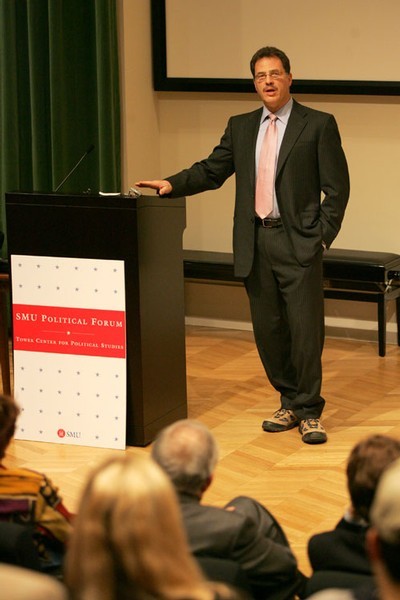
Author discusses situation in Iraq, solutions (Photo by John Schreiber, The Daily Campus)
Dr. Larry Diamond, author of “Squandered Victory: The American Occupation and the Bungled Effort to Bring Democracy to Iraq,” believes that things are not looking good for U.S. efforts at democracy in Iraq.
The Tower Center for Political Studies hosted a lecture by Diamond, followed by a question and answer session in the Smith Auditorium of the Meadows Museum, to an audience of students, professors, Tower Center members and members of the armed services on Wednesday.
Lynne Novack, associate director of the Tower Center, described the discussion as “sobering.”
“I think it reconfirmed my misgivings,” she said. “I’m very concerned about the direction we’re going.”
Secretary of State Condoleezza Rice sent Diamond to Baghdad for three months, from January to April of 2004, to work for the Coalition Provisional Authority on drafting an interim constitution in Iraq. While there, he spoke with Iraqis and felt moved by their emotion and longing for a democratic government.
“I have always felt that Iraq could become a democracy,” he said, adding that he thinks the United States is trying to rush the process. Diamond said most countries don’t evolve from tyranny to democracy overnight.
Diamond emphasized the Bush administration’s lack in military and political preparation for postwar reconstruction. He described the United States as having “arrogance, incompetence, isolation [and] ignorance” when entering Iraq, and said he thought the war was a mistake from the beginning.
Diamond said the Bush administration received studies before going to war that warned the United States of possible consequences. He described U.S. involvement as “criminal negligence,” since the country knew in advance the consequences of intervening but chose to go regardless. Diamond said security is provided by order, and the United States stood by with little assistance as looting and chaos erupted after the fall of Saddam Hussein.
According to Diamond, the Bush administration suggests the United States will withdraw once the Iraqi state is stable and can stand on its own. However, Diamond believes the contrary, that the United States is seeking permanent station in Iraq to access oil, now considered a natural resource by the new Iraqi constitution.
He does believe, however, that the United States should not pull out altogether at one time, but instead should do so in incremental stages over the course of several years in order to prevent insurgency.
Diamond said the United States is running out of time in Iraq and that civil war could erupt if the country does not improve its efforts.
Joining with the United Nations and European forces to establish an international coalition is the key to preventing civil war and repairing the problem of polarized militarization, according to Diamond.
He said European allies are not as distrusted as the United States, which he claims has ruined its credibility by not acknowledging the extent of its problems. In addition, he said the United States must be realistic in its goals and realize it doesn’t have all the correct answers.
For a stable Iraq, Diamond delivered the following propositions: Give all major political groups a share of power to encourage peace; keep the ministry of the interior and the militia as separate councils; and limit the number of provinces that can unite to form new regions. However, he admitted, “None of my views are shared by everybody – let’s face it.”
In response to a question about the United States’ responsibility to assist with other nations, Diamond said, “I think that we have a moral obligation as a result of the gifts we have been given in living in freedom to promote peace and sincerity in the rest of the world.”
Mel Kusin, president of the American Jewish Committee and founding member of the SMU Political Forum, praised Diamond for being a passionate patriot and teacher, saying, “The really great teachers are first of all great human beings. . . . You don’t see that very often.”
Diamond is senior fellow at the Hoover Institution and a political science and sociology professor at Stanford University.








